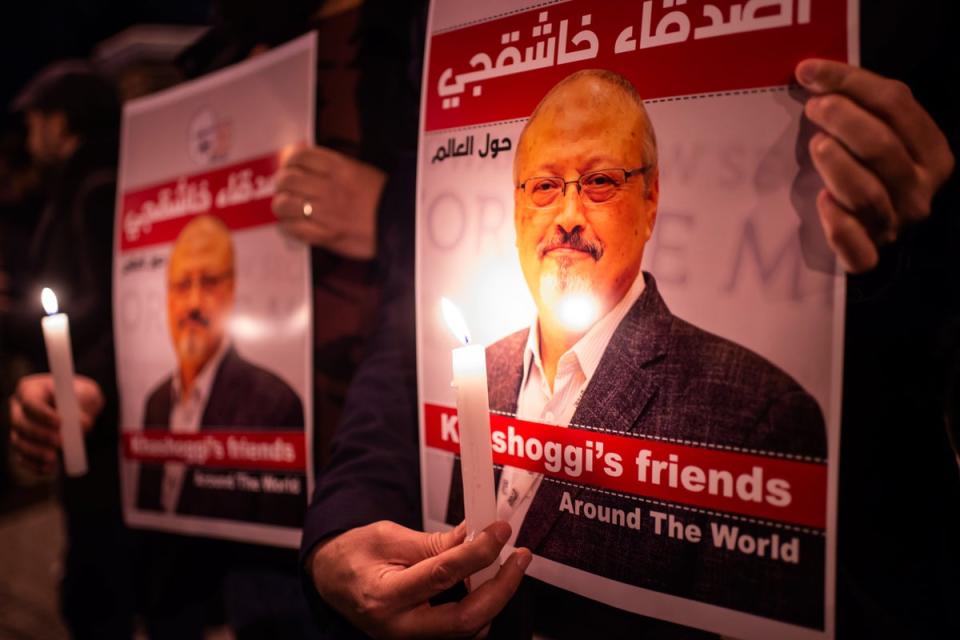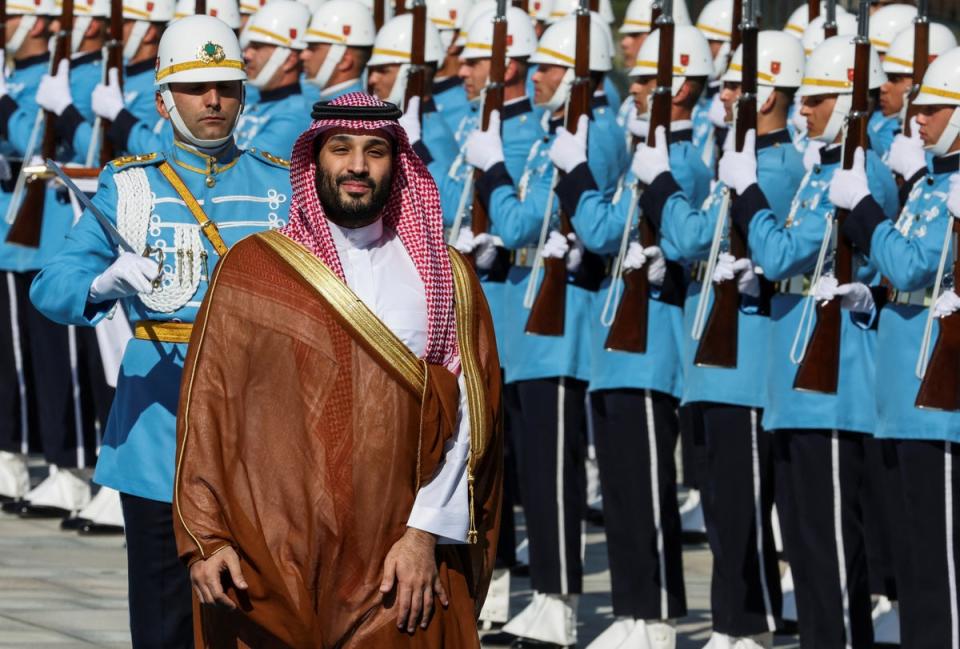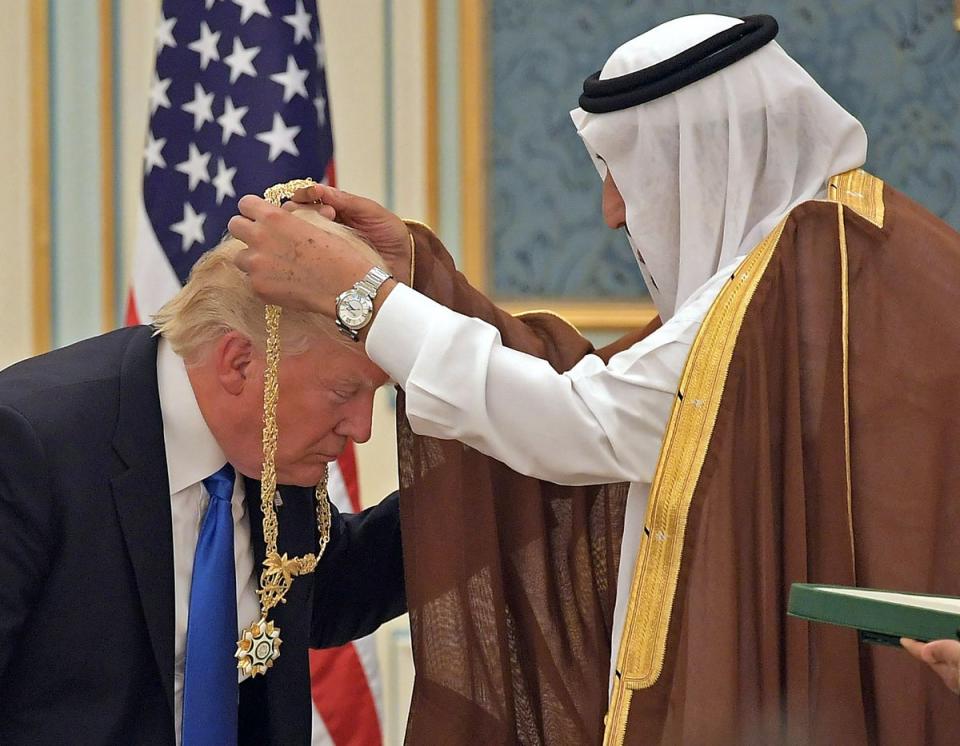Why did Joe Biden change his mind about making Saudi Arabia a ‘pariah nation’ over human rights?

Joe Biden could not have been any clearer.
The administration of Donald Trump, it was put to him by a questioner, had failed to punish Saudi Arabia for the murder of Jamal Khashoggi. If anything, it had cemented its ties, with Trump bowing before the Saudi king to receive a heavy and pendulous gold necklace, the Collar of Abdulaziz al Saud no less.
If he was president, what would Biden do? Would he punish the Saudi leaders?
“Yes. And I said at the time, Khashoggi was in fact murdered and dismembered, and I believe on the order of the crown prince,” he said with no small steel to his voice.
“I would make it very clear, we were not going to sell more weapons to them. We are going to make them pay the price, and make them in fact, the pariah that they are.”
He said Saudi Arabia was killing children in its bombing campaign in Yemen, and added: “There’s very little socially redeeming value in the present government in Saudi Arabia.”
That was November 2019, on the stage of the fifth Democratic debate in Atlanta, Georgia, along with rivals such as Bernie Sanders, Elizabeth Warren and Kamala Harris, as the party sought to select a presidential candidate to challenge Trump.
Two-and-a-half years later, sales of US and UK weapons to Saudi Arabia continue unabated, and nobody has been held accountable for the murder of the 57-year-old US-based Washington Post journalist.
There has been a four-month ceasefire in Yemen, yet to call it brittle would be to understate its fragility.
Despite some sanctions being directed at a handful of Saudi officials, there has been little genuine attempt to punish the most high-ranking in the kingdom, where all decisions of significance come from the top.
And this week, in what would be the clearest underscoring that the US-Saudi relationship is as solid as ever, Biden will make a four-day visit to the Middle East, part of which is an effort to help Israel, another longtime US ally, create a relationship with Saudi Arabia.
It is unclear if any agreement is to be announced this week – there may be an deal over allowing Israeli airliners fly over Saudi airspace – but Biden and others would like it to be in the vein of the 2020 Abraham Accords between Israel and the United Arab Emirates.
As part of his visit, Biden will travel to Saudi Arabia, as a guest of King Salman, together with eight additional heads of State for a meeting of the Gulf Cooperation Council (GCC), plus Egypt, Jordan and Iraq. The White House has said MBS is part of the Saudi team the president is due to sit and talk with during bilateral meetings.
In a briefing to reporters National Security adviser Jake Sullivan, said Biden’s trip was intended to do several things.
Asked whether Biden would photographed with MBS, Sullivan said he would leave questions over “precise modalities” to the trip’s organisers.
Asked he would raise Khashoggi’s murder, he said he would not “characterise what the president will say privately in those sessions”. He said the White House had been in touch with Khashoggi’s family.
Asked whether the president regretted his language on the campaign trail, Sullivan said: “The president has not expressed regret about his statements. What the president has been focused on is his view that the United States has important interests to advance and protect, including in partnership with Saudi Arabia.”
Sarah Leah Whitson, the Executive Director of Democracy for the Arab World Now (DAWN), a DC-based non-profit started by Khashoggi, has been among the most outspoken critics of Biden’s visit.
She tells The Independent Biden may at one point have genuinely wished to recalibrate the US’s relationship with the kingdom, but that the “overwhelming incentive structure in our government is to sell as much weapons as possible, maintain us control and hegemony and protect Israel”.
“The pressure on the Biden administration to go back to business as usual, is just overwhelming,” she says.
“The defence industry interests are completely tied to continuing to sell as much as possible to their number one and number two weapons clients in the world.”
She says Israel is seeking a deal with Saudi, and to become part of a strategic bloc – “a Middle East Nato” – set against Iran.

Yet, what is not on offer, she claims, are breakthroughs on human rights or even lower petroleum prices.
While some political prisoners have been released from jail, some remain subject to travel bans. Lina al-Hathloul, the sister of women’s rights activist Loujain al-Hathloul, on Monday urged Biden to raise the case of her sister – and those of all political prisoners when he meets the Saudi leadership.
Whitson says even if Saudi Arabia agreed to increase oil production, it was unlikely to get onto the markets soon enough to address the price hike created by energy sanctions against Russia. She says if Biden really wanted cheaper gas at the pumps, he would not have kept in place sanctions against oil from Iran and Venezuela.
Ahead of Biden’s visit, the widow of Khashoggi, Hanan El-Atr, wrote an open letter saying if the US president was to press ahead with the trip, he should use it to press the causes that were so important to her late husband.
“As his only wife upon his death, it is important to me that Jamal’s legacy of freedom and tolerance outlive his death,” she wrote. (At the time of his murder in October 2018 at the Saudi consulate in Istanbul, it emerged he had been planning to visit Saudi Arabia and was trying to obtain a visa, having apparently proposed marriage to Hatice Cengiz, a Turkish student.)
On Tuesday, El-Atr and her lawyer, Randa Fahmy, were invited to the White House to meet with senior officials.
“I am here today, before President Biden departs to Saudi Arabia, to thank him and express what Jamal wanted most in this world: the release of all political prisoners being held in Saudi Arabia, including Jamal’s close friend, Essam Al-Zamil,” she said in a statement. “I do not want those political prisoners to suffer the same fate as Jamal.”

Fahmy says it was important for El-Atr, to be “able to express exactly what Jamal would have wanted if he were alive today, particularly right before President Biden’s departure to Saudi Arabia.”
She adds: “This meeting is just the beginning of her long road to closure amid her grief. Part of that closure is also to hold all parties accountable for the death of her husband.”
Also seeking the release of political prisoner from Saudi Arabia, is Ensaf Haidar, a Saudi-Canadian human rights activist whose husband, Raif Badawi, a Saudi writer and dissident, was sentenced to ten years in prison and 1000 lashes in 2014.
“I am asking [Biden] to help me to bring Raif back to home in Canada,” she says. “In all my tours with officials in Europe everyone says only Americans can help you and i think it’s true.”
The Saudi government has always denied that the crown prince had any role in Khashoggi’s murder.
On Tuesday, there was no immediate response to questions put to the Saudi Embassy in Washington DC.
A statement on its website said: “The Kingdom of Saudi Arabia looks forward to welcoming President Biden and defining the next chapters of our partnership. At a time of global challenges related to the global economy, health, climate and international conflict, the partnership between our two countries is as critical as ever to the promotion of peace, prosperity and stability around the world.”
Hussein Ibish is a strategic analyst and a scholar at The Arab Gulf States Institute, a Washington DC think-tank. He believes Biden’s turn around on the issue over treating Saudi Arabia as a “pariah nation”, is connected to his stymied domestic agenda.
Biden is an ambitious man, he says, who came into office wish a major Covid-spending bill and a desire to invest heavily in infrastructure.
— hanan elatr khashoggiحنان العتر خاشقجى (@hananelatr) July 12, 2022
Once those ambitions ran into Republican opposition, and that of individuals in his own party such as Joe Manchin, the war in Ukraine gave Biden to find an international diplomatic win.
With the talks over an Iran nuclear deal stalling, the US needs a way to contain Tehran, says Ibish. By formally strengthening a bloc against Iran, centered around Saudi Arabia and Israel, it would show “the world the US is back”.
But how does Biden go from “pariah” to ally in such a short period?
“By giving it up – I mean, that’s it. What you’re looking at is a complete abandonment of that hollow campaign pledge, that was never going to be possible,” he says. “It was something he said, and when he said that, he was giving voice to a lot of Democratic outrage.”
In his briefing to reporters, Sullivan said Biden was “trying to do multiple things all at once to advance along a number of different tracks”.
He added: “America’s values — human rights — are a strategic interest of the United States. So is energy security, so is stopping terrorism, so is seeking peace in a place like Yemen.”

 money
money 